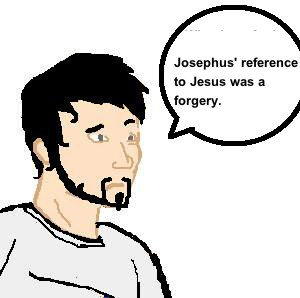 Are there any early accounts or testimonies of the life of Jesus that are independent of the biblical data? Well, before beginning to discuss the data in Josephus, it should be noted that it would be a mistake to discount the biblical data simply because it is a theological text. While Christians do believe that it is divinely inspired, it is also a product of human hands. It is a collection of historical documents and it contains a wealth of information, the best available data that we possess of the historical person Jesus of Nazareth. It is a collection of historical biographies written within a generation of his life, and a collection of letters reflecting the earliest information that was circulating about his life. It is a historians’ delight. With that in mind, is there anything else that testifies to the life of Jesus? Aside from the best resource that we have, is there anything else that might serve a supplemental purpose? Well, certainly. The testimony of Josephus in his Antiquities of the Jews speaks of Jesus. But, did Josephus write about Jesus, or was it entirely a forgery?
Are there any early accounts or testimonies of the life of Jesus that are independent of the biblical data? Well, before beginning to discuss the data in Josephus, it should be noted that it would be a mistake to discount the biblical data simply because it is a theological text. While Christians do believe that it is divinely inspired, it is also a product of human hands. It is a collection of historical documents and it contains a wealth of information, the best available data that we possess of the historical person Jesus of Nazareth. It is a collection of historical biographies written within a generation of his life, and a collection of letters reflecting the earliest information that was circulating about his life. It is a historians’ delight. With that in mind, is there anything else that testifies to the life of Jesus? Aside from the best resource that we have, is there anything else that might serve a supplemental purpose? Well, certainly. The testimony of Josephus in his Antiquities of the Jews speaks of Jesus. But, did Josephus write about Jesus, or was it entirely a forgery?
 In 18:3:3, Josephus writes, “Now there was about this time Jesus, a wise man, if it be lawful to call him a man; for he was a doer of wonderful works, a teacher of such men as receive the truth with pleasure. He drew over to him both many of the Jews and many of the Gentiles. He was [the] Christ. And when Pilate, at the suggestion of the principal men amongst us, had condemned him to the cross, those that loved him at the first did not forsake him; for he appeared to them alive again the third day; as the divine prophets had foretold these and ten thousand other wonderful things concerning him. And the tribe of Christians, so named from him, are not extinct at this day.” I will be drawing from Dr. John Meier’s book A Marginal Jew (Volume I, Chapter 3, pages 56-89) to demonstrate that this writing is at least partially authentically being derived from the pen of Josephus.
In 18:3:3, Josephus writes, “Now there was about this time Jesus, a wise man, if it be lawful to call him a man; for he was a doer of wonderful works, a teacher of such men as receive the truth with pleasure. He drew over to him both many of the Jews and many of the Gentiles. He was [the] Christ. And when Pilate, at the suggestion of the principal men amongst us, had condemned him to the cross, those that loved him at the first did not forsake him; for he appeared to them alive again the third day; as the divine prophets had foretold these and ten thousand other wonderful things concerning him. And the tribe of Christians, so named from him, are not extinct at this day.” I will be drawing from Dr. John Meier’s book A Marginal Jew (Volume I, Chapter 3, pages 56-89) to demonstrate that this writing is at least partially authentically being derived from the pen of Josephus.
 Christians certainly did manipulate this passage. There are certain aspects of this passage that would just not reflect the thought of an orthodox Jew such as Josephus, as he was most certainly not a Christian. For him to employ such Christian characterizations of Jesus would be exceedingly unlikely. After all, one short paragraph about Jesus is hardly fitting if he really did regard this man as the Messiah, the Savior of the Jews, who overturned all expectations, was God the Son and commissioned all men to make disciples of all nations. For Josephus to claim that he believed that Jesus was the Messiah and say nothing else of the matter would be to demonstrate a startling lack of piety and devotion.
Christians certainly did manipulate this passage. There are certain aspects of this passage that would just not reflect the thought of an orthodox Jew such as Josephus, as he was most certainly not a Christian. For him to employ such Christian characterizations of Jesus would be exceedingly unlikely. After all, one short paragraph about Jesus is hardly fitting if he really did regard this man as the Messiah, the Savior of the Jews, who overturned all expectations, was God the Son and commissioned all men to make disciples of all nations. For Josephus to claim that he believed that Jesus was the Messiah and say nothing else of the matter would be to demonstrate a startling lack of piety and devotion.
 He began his summary of Jesus by saying of him, “if indeed it be lawful to call him a man.” This is clearly a recognition of the Christian beliefs about the identity of Jesus. He was not merely a man, but he was God the Son, the second person of the trinity. If I were to describe Jesus by saying that he was a man, most Christians would find that unsatisfying. Though he was a man, he was more than a man. He was totally man and totally God. He was the God-man. This passage clearly refers to Jesus in Christian terms. Second, it refers to Jesus as “the Messiah,” which, again, would be unlikely considering that Josephus did not believe that Jesus was the Messiah. Third, it quoted the oral tradition found in 1 Corinthians 15:5, saying that Jesus appeared to many, according to the Scriptures. These are clearly Christian interpolations of the Antiquities.
He began his summary of Jesus by saying of him, “if indeed it be lawful to call him a man.” This is clearly a recognition of the Christian beliefs about the identity of Jesus. He was not merely a man, but he was God the Son, the second person of the trinity. If I were to describe Jesus by saying that he was a man, most Christians would find that unsatisfying. Though he was a man, he was more than a man. He was totally man and totally God. He was the God-man. This passage clearly refers to Jesus in Christian terms. Second, it refers to Jesus as “the Messiah,” which, again, would be unlikely considering that Josephus did not believe that Jesus was the Messiah. Third, it quoted the oral tradition found in 1 Corinthians 15:5, saying that Jesus appeared to many, according to the Scriptures. These are clearly Christian interpolations of the Antiquities.
 This charge is usually developed by the raving and radical skeptics who emote the unlikelihood of the existence of Jesus as a historical figure. This will lead them to the conclusion that Josephus did not mention Jesus of Nazareth at all, and that the entire section was a forgery. Is that true? Did Josephus write about Jesus, or was it entirely a forgery? I submit the position that these interpolations warrant the conclusion that it is entirely a forgery is far too simplistic.
This charge is usually developed by the raving and radical skeptics who emote the unlikelihood of the existence of Jesus as a historical figure. This will lead them to the conclusion that Josephus did not mention Jesus of Nazareth at all, and that the entire section was a forgery. Is that true? Did Josephus write about Jesus, or was it entirely a forgery? I submit the position that these interpolations warrant the conclusion that it is entirely a forgery is far too simplistic.
Jesus “won over” the Gentiles. Dr. Meier pointed out that it is quite curious for Josephus to say that Jesus had won over people of Greek origin if he was familiar with or took the gospel records as authoritative. For Jesus did not win over the Gentiles. His mission was particularly for the lost children of Israel (Matthew 10:5-6). There certainly are a few exceptions, but during his earthly ministry, that was his intention. It was only after his resurrection from the dead that Jesus commissioned his disciples to go into “all nations,” (Matthew 28:19). This means that a Christian would be unlikely to say that Jesus of Nazareth won over a good deal of Greek disciples, because the testimony of the gospel records would be to the contrary. It is more likely that Josephus retrojected the situation of his present day onto the life of Jesus. That was a common error among historians of the day and understandable. Did Josephus write about Jesus, or was it entirely a forgery? He probably wrote this detail about Jesus.
Who condemned Jesus? Throughout the gospel records, it is depicted that the Jewish Sanhedrin were guilty of condemning Jesus to death (Matthew 27:25). They were envious of Jesus throughout his ministry and persecuted him unto death. Pilate is almost depicted as a passive recipient of the Jews’ will, afraid of the wrath of Caesar (John 19:12). It is pretty explicit that it was the Jews who condemned him and Pilate was the resource that they employed to bring about the execution. Yet that is not the picture of the crucifixion that we see in Josephus. Josephus says that “Pilate, at the suggestion of the principal men amongst us, had condemned him to the cross.” In this depiction, Pilate alone is responsible, and the Sanhedrin are advisers. Did Josephus write about Jesus, or was it entirely a forgery? There is clearly a contrast between the condemnation of Jesus in the gospels and in Josephus. Hence, somebody who was familiar with the gospels probably would not write it in this way.
The tribe of Christians has not yet died out. Josephus concludes the section about Jesus by saying that the tribe of Christians has not yet died out, even until this day. The implication, argues Dr. Meier, “seems to be one of surprise: granted Jesus’ shameful end (with no new life mentioned in the core text), one is amazed to note, says Josephus,that this group of post-mortem lovers is still at it and has not disappeared even in our own day (Does Josephus have in mind Nero’s attempt to get it to disappear?). I detect in the sentence as a whole something dismissive if not hostile (though any hostility here is aimed at Christians, not Jesus): one would have thought by now that this “tribe” of lovers of a crucified man would have disappeared. This does not sound like an interpolation by a Christian of any stripe.” (Page 66). Did Josephus write about Jesus, or was it entirely a forgery? The dismissive tone seems to indicate that he did write about Jesus.
His reference to John the Baptist. Josephus also mentioned John the Baptist, and while it did not explicitly mentioned Jesus, it is interesting obviously because John ushered in the ministry of Jesus. Further, since it does not mention Jesus, it is unlikely to be a Christian interpolation, as the role of John was to point to the one who was greater than he. So Josephus provided independent evidence of John the Baptist. In book 18, chapter 5, paragraph 2, he recounts John’s arrest, incarceration and even his execution, just with fewer details than the gospel narratives. He even refers to John fondly. But, interestingly, he writes, that John “commanded the Jews to exercise virtue, both as to righteousness towards one another, and piety towards God, and so to come to baptism; for that the washing [with water] would be acceptable to him, if they made use of it, not in order to the putting away [or the remission] of some sins [only], but for the purification of the body.” According to Josephus, John’s baptism was not for the remission of sins. Now this sounds exceedingly similar to the gospels – which explicitly say that his baptism was for the remission of sins (Mark 1:4). This line seems to be an attempt to counteract the Christian claim about John’s baptism. Did Josephus write about Jesus, or was it entirely a forgery? The bit about John the Baptist was certainly not a forgery.
James the brother of Jesus. In book 20, chapter 9, Josephus describes the execution of James. Probably with no way to distinguish him from other men named James (as it was a very common name), he refers to him as “the brother of Jesus, who is called the Messiah.” Now, recall the Christian interpolations of the other reference to Jesus. It is decorated with divinity, that he is more than a man, that he rose from the dead according to the Scriptures. But this reference is almost blasé. Jesus is referred to in passing, used to identify this other man, James. Further, the standard Christian account of the death of James as recorded in Clement 2:23:3,19 differs from that recorded in Josephus. Did Josephus write about Jesus, or was it entirely a forgery? His passing reference to Jesus in 20:9 was almost certainly authentic.
Did Josephus write about Jesus, or was it entirely a forgery? I would like to point out that history is an inductive investigation. It is probabilistic. So while one could conjure up a number of scenarios wherein every reference to Jesus was a forgery, that is not how historical investigation is done. The historian looks for the simplest explanation and that which comports best with the evidence. Accordingly, Josephus almost certainly wrote about Jesus and both of the references to him are probably authentic. Josephus probably originally wrote:
“At this time there appeared Jesus, a wise man. For he was a doer of startling deeds, a teacher of people who receive the truth with pleasure. And he gained a following both among many Jews and among many of Greek origin. And when Pilate, because of an accusation made by the leading men among us, condemned him to the cross, those who had loved him previously did not cease to do so. And up until this very day the tribe of Christians (named after him) has not died out.”
If you would like to get in on the discussion about this, join my Theology Discussion Group!